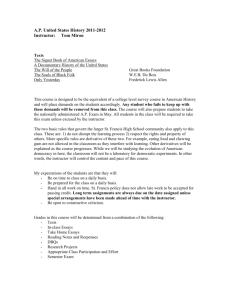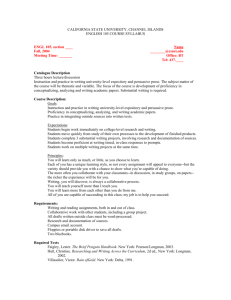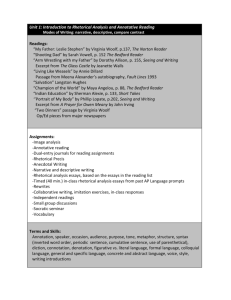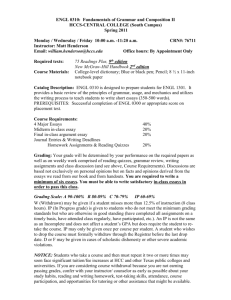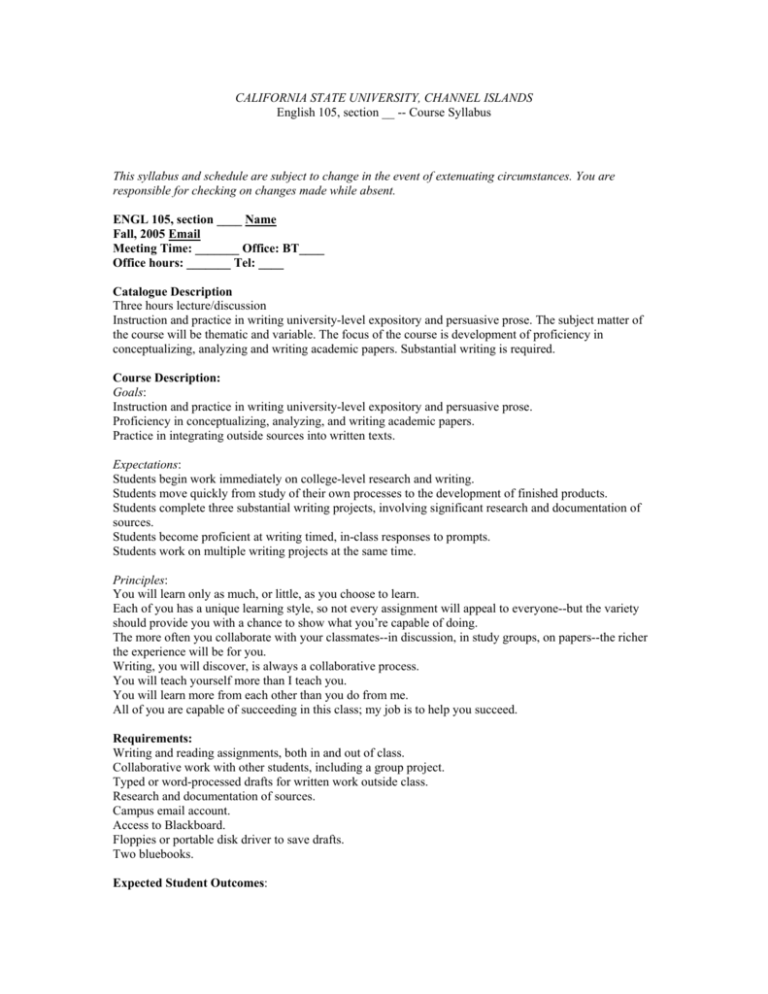
CALIFORNIA STATE UNIVERSITY, CHANNEL ISLANDS
English 105, section __ -- Course Syllabus
This syllabus and schedule are subject to change in the event of extenuating circumstances. You are
responsible for checking on changes made while absent.
ENGL 105, section ____ Name
Fall, 2005 Email
Meeting Time: _______ Office: BT____
Office hours: _______ Tel: ____
Catalogue Description
Three hours lecture/discussion
Instruction and practice in writing university-level expository and persuasive prose. The subject matter of
the course will be thematic and variable. The focus of the course is development of proficiency in
conceptualizing, analyzing and writing academic papers. Substantial writing is required.
Course Description:
Goals:
Instruction and practice in writing university-level expository and persuasive prose.
Proficiency in conceptualizing, analyzing, and writing academic papers.
Practice in integrating outside sources into written texts.
Expectations:
Students begin work immediately on college-level research and writing.
Students move quickly from study of their own processes to the development of finished products.
Students complete three substantial writing projects, involving significant research and documentation of
sources.
Students become proficient at writing timed, in-class responses to prompts.
Students work on multiple writing projects at the same time.
Principles:
You will learn only as much, or little, as you choose to learn.
Each of you has a unique learning style, so not every assignment will appeal to everyone--but the variety
should provide you with a chance to show what you’re capable of doing.
The more often you collaborate with your classmates--in discussion, in study groups, on papers--the richer
the experience will be for you.
Writing, you will discover, is always a collaborative process.
You will teach yourself more than I teach you.
You will learn more from each other than you do from me.
All of you are capable of succeeding in this class; my job is to help you succeed.
Requirements:
Writing and reading assignments, both in and out of class.
Collaborative work with other students, including a group project.
Typed or word-processed drafts for written work outside class.
Research and documentation of sources.
Campus email account.
Access to Blackboard.
Floppies or portable disk driver to save drafts.
Two bluebooks.
Expected Student Outcomes:
1. Critical Thinking: Students will achieve the following:
an ability to analyze written work
an ability to frame conclusions from a range of information
an ability to predict outcomes based on known information
2. Communication Skills: Students will achieve the following:
an ability to more clearly and more effectively write academic papers
an ability to effectively and convincingly verbalize their ideas
an ability to work effectively in group processes
3. Research Skills: Students will gain the following:
a familiarity with research trends and directions
a familiarity with major data bases
a proficiency with basic computing skills
an ability to discern valid research conclusions
ability to design, conduct and defend a research project
4. Self Development
ability to cogently reflect on roles of learning on personal and intellectual growth
Required Texts
Faigley, Lester. The Brief Penguin Handbook. New York: Pearson/Longman, 2003.
Island Voices: First-Year Student Essays. Camarillo, CA: CSUCI, 2004.
Williams, Terry Tempest. The Open Space of Democracy. publisher, 2005.
Additional Expenses:
Xeroxing copies of your papers for workshops and portfolio
Folders and disks
Disabilities Statement
Students who have disabilities or special needs and require accommodations in order to have equal access
to classrooms must register with the designated staff member in Student Affairs in order for us to serve
their needs.
Evaluation
The majority of your final grade will be based on a portfolio of three finished pieces of writing. These outof-class essays will go through multiple drafts during the semester, with the final versions submitted (with
all drafts attached) at the end of the semester. In addition, you will write two in-class essays during the
term. Both the in-class essays and out-of-class portfolio will be holistically evaluated by the composition
team using the same criteria. (See the separate handout on Grading Criteria in the First Year Writing
Program.) Final grades will be A through F with no pluses and minuses.
In-class essays: 1st in-class essay 10%
15%
25%
Portfolio
3 best essays chosen from among your Narrative/Reflective, Problem/Solving, and
Argumentative/Perusasive essays, as well as your Group Project. (At least 2 must have cited sources.)
55%
2nd in-class essay
Participation* 20%
100%
* Participation includes attendance, contribution to small groups, willingness to share work with peers,
coming to class prepared, taking advantage of available resources (see below) and attending additional
demonstrations and/or workshops as appropriate.
Your final grade will be based on the percentages noted above for your in-class essays, your class
participation, and the revised papers you submit in your portfolio at the end of the term. Throughout the
semester, you will receive abundant feedback on your papers from your classmates, often in small groups,
and your teacher, in conferences during class. If you want more feedback, schedule a conference with your
instructor (see Resources below). You will have the entire semester to revise and polish the three papers in
your portfolio so they represent your best capabilities as a writer.
As a class we will use the same grading criteria during our discussions that the portfolio readers use when
they evaluate in-class essays and the end-of-term portfolios. Those criteria (see Grading Criteria in the First
Year Writing Program below) will guide our discussions of how to revise your papers.
Policies:
Attendance--"An instructor may drop a student who does not attend class and has not made prior
arrangements with the instructor. This may occur as early as the first class meeting" (CSUCI, Schedule of
Classes, p.8). The student must notify the instructor, in advance if possible, about any missed classes. If
you miss more than three class hours, you may receive a failing grade, unless there are extenuating
circumstances that you discuss with the instructor at the first available opportunity. If you are absent from
any class, you are expected to be caught up with the work when you return to class.
Late Papers--If you keep up with the work, this class is not difficult. If you get behind, the workload may
bury you. Although you won't assemble your final portfolio until late in the semester, you will nonetheless
need to submit completed drafts of assigned papers on the dates set by your instructor in order to receive
timely and helpful feedback from the instructor and your peers.
Plagiarism--All work that students submit as their own work must, in fact, be their own work. If a paper
presents ideas or information from other sources, it must clearly indicate the source. Word-for-word
language taken from other sources -- books, papers, web sites, interviews, conversations, etc. -- must be
placed in quotation marks and the source identified. Paraphrased material must be cited. In accordance
with the CSU Channel Islands policy on academic dishonesty, students who knowingly plagiarize ideas or
language will fail the course.
Students are encouraged to consult with the instructor if they have questions about what might constitute an
act of plagiarism or cheating.
Resources:
In the Writing Center, trained student consultants are available to assist you with composing a first draft,
editing, and polishing your papers. Check the display in front of the Advising Center in room 1301 for
current schedules.
Conferences with your instructor can be arranged ahead of time by contacting her or him before or after
class, during office hours, or by email. Do yourself a favor and arrange a conference early in the semester.
You’ll be glad you did.
Important Dates:
29 Aug Classes begin
5 Sept. Labor Day holiday
19-22 Sept. In-class essay #1
31-3 Oct-Nov. In-class essay #2
8 Nov. Terry Tempest Williams on campus
24-5 Nov. Thanksgiving holiday
5-8 Dec. Portfolios due / last day of class
Assignments:
In-class essay topics will be announced one week before the essay is written. You will have one hour to
write and revise the essay.
Out-of-class papers will all involve some sort of research, and they will become more challenging as the
semester progresses. They will provide experience with various kinds of research writing, all of it intended
to be read by an academic audience--university faculty, staff and students--the primary audience you will
be writing for over the next few years.
The following are general descriptions of typical writing assignments in ENGL 150. Specific assignments
will be distributed by your teacher as the semester progresses.
1. The first paper assignment will ask you to report on a topic of interest to you related to the course theme.
This paper is intended to serve as a quick introduction to the essentials of research writing: selecting a
subject, researching several sources (including internet and printed), summarizing your findings, citing
your sources and reporting to your audience what you have learned. It is not necessary that your paper
argue for or against anything, nor do you have to evaluate the validity of the information you find. Your
opinions on the subject are not relevant to the report, though your instructor may ask you to write about
them separately. The purpose of the report is, simply, to tell an audience of your peers, in your own words,
what you have found out during the course of your research.
2. The second paper will ask you to define a problem and argue for a solution. Some research will be
necessary. Class discussion and brainstorming sessions will prepare you for the task. At some point in your
paper, you should:
•Define and clarify the problem you select to write about.
•Briefly summarize previous investigations to inform your reader of the current state of research on the
problem, or use research to persuade your reader that a problem exists and needs a solution.
•Propose the next step or stage in solving the problem.
3. The third paper will be a more extensive research project in which you use your research (from a
previous assignment or newly generated) to argue for or against a controversial issue or question related
to the theme in your course. In this research paper, simply reporting what you find is not enough. You must
also evaluate the sources you use, make a case for their trustworthiness and reliability, and use them to
argue your case.
4. The group research projects are intended to give you experience working collaboratively with your
peers on a project of your own design. Small groups of students will choose an issue or problem to research
and write about. Ideas for topics may come from other classes you are taking, from your experiences at
CSUCI, or from the communities in which you live and attend school. We will brainstorm possible topics
early in the semester. Your group will work collaboratively to produce a single document. You will share
the research and writing responsibilities. If someone in your group is not pulling their weight, please let me
know.
After determining your issue or problem, your group will identify possible sources of information,
including interviews with people on campus or in the community, articles in campus and local newspapers,
information about other how other groups deal with the problem, readings from your other classes, internet
sources, etc.
If your group wishes to poll the campus or community, you’ll need to develop a questionnaire, test it out in
class, revise it, and then administer the questionnaire and gather your data.
Groups will probably begin writing up their reports before they finish collecting data. It is important to
keep good records of your sources because you must credit all sources (whether in print or conversation).
To get feedback from the class, your group will make a brief oral presentation of your findings. The class
will ask questions, make suggestions, perhaps even direct you to other sources.
You will have several opportunities during the final weeks of the semester to get feedback on your written
report before submitting it. The earlier you get a draft done, the more help you’ll get.
Purpose of the report: to inform readers about an issue or problem of concern to them and you, or to
answer a specific question of import to you and others.
Audience: depends on the problem you choose to research. Your audience could be as broad as the
community of Camarillo, members of the CSUCI community, faculty and students in your others courses,
or it could be as specific as a particular person in position to change the problem (e.g., the head of Campus
Parking, the Dean of Students, the Camarillo City Council), or a group of students you intend to inform
about some aspect of CSUCI (e.g., incoming freshmen).
Your portfolio will include polished copies of the three out-of-class papers you believe best represent your
writing, plus all the drafts leading up to the final copy. The portfolio is due the final day of class.
Schedule
(Subject to change)
Week
1. 29 Aug. Classes begin
2. 5 Sept. Labor Day
3. 12-15 Sept.
4. 19-22 Sept. In-class essay #1
5. 26-29 Sept. In-class essays scored
6. 3-6 Oct. In-class essays returned
7. 10-13 Oct.
8. 17-20 Oct.
9. 24-27 Oct.
10. 31-3 Oct/Nov. In-class essay #2
11. 7-10 Nov. In-class essays scored
8 Nov. Terry Tempest Williams on campus
12. 14-17 Nov. In-class essays returned
13. 21-23 Nov.
24-25 Nov. Thanksgiving holiday
14. 28-1 Nov/Dec.
15. 5-8 Dec. Portfolios due
12-15 Dec. Portfolio scoring
21 Dec. Grades due
Criteria of Good Writing in the First-Year Writing Program at CSUCI
(These criteria are used in ENGL 102, 103 and 105.)
Content
The material challenges the intelligence and sophistication of the intended audience.
A single focus is emphasized through the entire paper.
The focus is consistently developed with significant and interesting details, examples, and discussion.
Relevant outside sources are clearly introduced and integrated into the surrounding discussion.
Organization
The focus of the paper is clearly emphasized.
The overall pattern is artfully conceived.
The focus is developed through a sequence of related paragraphs.
Paragraphs are purposefully organized and substantially developed with supporting evidence or detailed
examples.
Transitions between and within paragraphs are explicit, clear, and purposeful.
Style
Sentence structure varies according to the content, purpose and audience.
The sentences are clear, logical, and enjoyable to read.
Word choice is precise, interesting, and appropriate to the writing task.
The language is mature and idiomatic.
The writer's tone complements the paper's purpose and suits the audience.
Mechanics
Format is appropriate.
References to outside sources are cited and documented according to the appropriate style sheet.
Problems in grammar, spelling, punctuation, or usage do not interfere with communication.

